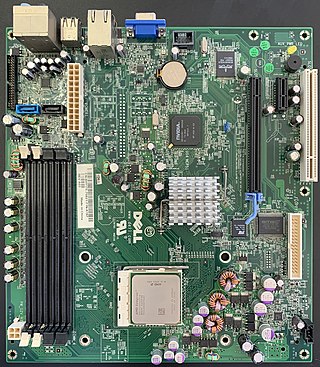Related Research Articles

Computer engineering is a branch of computer science and electronic engineering that integrates several fields of computer science and electronic engineering required to develop computer hardware and software. Computer engineering is referred to as computer science and engineering at some universities.
In software engineering, software configuration management is the task of tracking and controlling changes in the software, part of the larger cross-disciplinary field of configuration management. SCM practices include revision control and the establishment of baselines. If something goes wrong, SCM can determine the "what, when, why and who" of the change. If a configuration is working well, SCM can determine how to replicate it across many hosts.

Machine vision (MV) is the technology and methods used to provide imaging-based automatic inspection and analysis for such applications as automatic inspection, process control, and robot guidance, usually in industry. Machine vision refers to many technologies, software and hardware products, integrated systems, actions, methods and expertise. Machine vision as a systems engineering discipline can be considered distinct from computer vision, a form of computer science. It attempts to integrate existing technologies in new ways and apply them to solve real world problems. The term is the prevalent one for these functions in industrial automation environments but is also used for these functions in other environment vehicle guidance.

Automation describes a wide range of technologies that reduce human intervention in processes, mainly by predetermining decision criteria, subprocess relationships, and related actions, as well as embodying those predeterminations in machines. Automation has been achieved by various means including mechanical, hydraulic, pneumatic, electrical, electronic devices, and computers, usually in combination. Complicated systems, such as modern factories, airplanes, and ships typically use combinations of all of these techniques. The benefit of automation includes labor savings, reducing waste, savings in electricity costs, savings in material costs, and improvements to quality, accuracy, and precision.

ABB Ltd. is a Swedish-Swiss multinational corporation headquartered in Västerås, Sweden, and Zürich, Switzerland. It is traded on the SIX Swiss Exchange in Zürich, the Nasdaq Nordic exchange in Sweden and the OTC Markets Group's pink sheets in the United States. It was ranked 340th in the Fortune Global 500 list of 2020 and has been a global Fortune 500 company for 24 years.
Mechatronics engineering, also called mechatronics, is an interdisciplinary branch of engineering that focuses on the integration of mechanical engineering, electrical engineering, electronic engineering and software engineering, and also includes a combination of robotics, computer science, telecommunications, systems, control, and product engineering.

Logistics automation is the application of computer software or automated machinery to improve the efficiency of logistics operations. Typically this refers to operations within a warehouse or distribution center, with broader tasks undertaken by supply chain engineering systems and enterprise resource planning systems.

Rockwell Automation, Inc. is an American provider of industrial automation and digital transformation technologies. Brands include Allen-Bradley, FactoryTalk software and LifecycleIQ Services.

FANUC is a Japanese group of companies that provide automation products and services such as robotics and computer numerical control wireless systems. These companies are principally FANUC Corporation of Japan, Fanuc America Corporation of Rochester Hills, Michigan, USA, and FANUC Europe Corporation S.A. of Luxembourg.

The International Society of Automation (ISA), formerly known as The Instrumentation, Systems, and Automation Society, is a non-profit technical society for engineers, technicians, businesspeople, educators and students, who work, study or are interested in automation and pursuits related to it, such as instrumentation. It was originally known as the Instrument Society of America. The society is more commonly known by its acronym, ISA, and the society's scope now includes many technical and engineering disciplines. ISA is one of the foremost professional organizations in the world for setting standards and educating industry professionals in automation. Instrumentation and automation are some of the key technologies involved in nearly all industrialized manufacturing. Modern industrial manufacturing is a complex interaction of numerous systems. Instrumentation provides regulation for these complex systems using many different measurement and control devices. Automation provides the programmable devices that permit greater flexibility in the operation of these complex manufacturing systems.
KUKA is a German manufacturer of industrial robots and factory automation systems. In 2016, the company was acquired by Chinese appliance manufacturer Midea Group.
A systems integrator is a person or company that specializes in bringing together component subsystems into a whole and ensuring that those subsystems function together, a practice known as system integration. They also solve problems of automation. Systems integrators may work in many fields but the term is generally used in the information technology (IT) field such as computer networking, the defense industry, the mass media, enterprise application integration, business process management or manual computer programming. Data quality issues are an important part of the work of systems integrators.
Objective Interface Systems, Inc. is a computer communications software and hardware company. The company's headquarters are in Herndon, Virginia, USA. OIS develops, manufactures, licenses, and supports software and hardware products that generally fit into one or more of the following markets:

Manufacturing engineering or production engineering is a branch of professional engineering that shares many common concepts and ideas with other fields of engineering such as mechanical, chemical, electrical, and industrial engineering. Manufacturing engineering requires the ability to plan the practices of manufacturing; to research and to develop tools, processes, machines and equipment; and to integrate the facilities and systems for producing quality products with the optimum expenditure of capital.

Open-source robotics is a branch of robotics where robots are developed with open-source hardware and free and open-source software, publicly sharing blueprints, schematics, and source code. It is thus closely related to the open design movement, the maker movement and open science.
Functional safety is the part of the overall safety of a system or piece of equipment that depends on automatic protection operating correctly in response to its inputs or failure in a predictable manner (fail-safe). The automatic protection system should be designed to properly handle likely systematic errors, hardware failures and operational/environmental stress.
Manufacturing Enterprise Solutions Association International is a worldwide not-for-profit community of manufacturing companies, information technology hardware and software suppliers, system integrators, consulting service providers, analysts, editors, academics, and students. MESA's goal is to help member companies improve business results and production operations through application and implementation of information technology and best management practices.
Industrial and production engineering (IPE) is an interdisciplinary engineering discipline that includes manufacturing technology, engineering sciences, management science, and optimization of complex processes, systems, or organizations. It is concerned with the understanding and application of engineering procedures in manufacturing processes and production methods. Industrial engineering dates back all the way to the industrial revolution, initiated in 1700s by Sir Adam Smith, Henry Ford, Eli Whitney, Frank Gilbreth and Lilian Gilbreth, Henry Gantt, F.W. Taylor, etc. After the 1970s, industrial and production engineering developed worldwide and started to widely use automation and robotics. Industrial and production engineering includes three areas: Mechanical engineering, industrial engineering, and management science.

Automation technicians repair and maintain the computer-controlled systems and robotic devices used within industrial and commercial facilities to reduce human intervention and maximize efficiency. Their duties require knowledge of electronics, mechanics and computers. Automation technicians perform routine diagnostic checks on automated systems, monitor automated systems, isolate problems and perform repairs. If a problem occurs, the technician needs to be able to troubleshoot the issue and determine if the problem is mechanical, electrical or from the computer systems controlling the process. Once the issue has been diagnosed, the technician must repair or replace any necessary components, such as a sensor or electrical wiring. In addition to troubleshooting, Automation technicians design and service control systems ranging from electromechanical devices and systems to high-speed robotics and programmable logic controllers (PLCs). These types of systems include robotic assembly devices, conveyors, batch mixers, electrical distribution systems, and building automation systems. These machines and systems are often found within industrial and manufacturing plants, such as food processing facilities. Alternate job titles include field technician, bench technician, robotics technician, PLC technician, production support technician and maintenance technician.
PLC technicians design, program, repair, and maintain programmable logic controller (PLC) systems used within manufacturing and service industries ranging from industrial packaging to commercial car washes and traffic lights.
References
- ↑ "Automation Integrator Guide, 2011 Articles". Control Engineering. Retrieved 16 April 2012.
- ↑ VanDoren, Vance. "The Best In Automation System Integration, 2011". Control Engineering. Retrieved 16 April 2012.
- ↑ VanDoren, Vance. "System Integrator Certification Catches On". Control Engineering. Retrieved 10 May 2012.
- ↑ Anandan, Tanya. "Protecting End Users and Suppliers -- Best Practices for Robot Integrators". Robotics.org. Robotic Industries Association. Retrieved 10 April 2015.
- ↑ "Automation Integrator Guide". VanDoren Industries. Retrieved 16 April 2012.